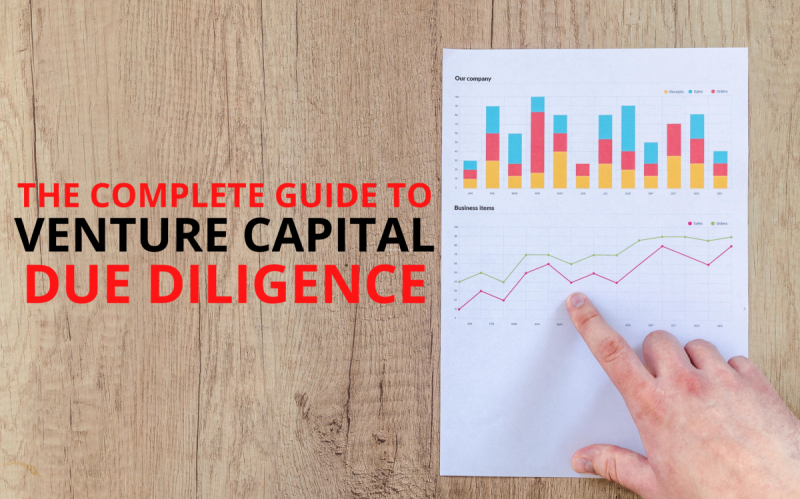To understand Due Diligence in Venture Capital let’s understand this. There’s an expression in venture capital. It’s called the “Oh, shit” board meeting.
That’s when you learn all sorts of things that you wish you’d known after writing a company that first check. It’s easy to imagine that they’ve been happening across the startup industry.
In recent years, the pace of funding has been feverish. Therefore, this also gives investors less time than ever to assess the startups they’re funding.
There are once-celebrated companies. These include the blood testing outfit Theranos, and the wireless charging company uBeam. These are fighting for their lives. This also raises plenty of questions.
Venture capitalism is the investment of money in unproven startup companies. In other words, investing in early-stage companies is risky. Here’s where due diligence comes in.
Venture Capital Due diligence is what an investor does to check a potential investment opportunity. Venture Capital Due diligence selects the potential winners. So, they should identify the critical risks associated with investment.
In addition, they should also develop a risk mitigation plan with company management. This article will guide venture capitalists and startups on proper due diligence. It will also guide them on how they can prepare for the process.
Reasons for Venture Capital Due Diligence

Startup capital barriers are being liberated through the JOBS Act and crowdfunding. Growth and awareness of startup communities worldwide are also playing a part.
So opportunities are overwhelming individual investors. They can put capital into a variety of new business ventures. Therefore, this has made the role of due diligence even more important.
As reported in Forbes, many startups fail because they make a product no one wants. The majority of businesses start to meet the entrepreneur’s needs. So,they don’t consider the widespread appeal.
Richard E. Gerber is the author of the book E-Myth. He theorizes that most entrepreneurs think they can get by doing technical work. They don’t realize they need to be managers and entrepreneurs, all in equal doses.
Inc. published a large crowd-sourced pool of data using answers from Quora. It reports that market saturation is one of the most significant issues. There are more failed products in the world now than ever before.
This is because startups try to be 0.5% of a 50-billion-dollar market. They do not try to be 50% of a 100-million-dollar market.
Entrepreneur criticizes most startups for their business plans, claiming they rely on a black box labelled ‘???’ in the space between ‘idea’ and ‘success.’
Read 101 Startup Post-Mortems and hear straight from the founders how it all went wrong.
People dispute statistics. But most sources agree that around 75 per cent of startups fail. The 25 per cent that succeeds all have things in common. Investors can identify them before investing anything.
All due-diligence procedures have some indicators. These include defending against bad investments and identifying common traits of past successes. They help you steer clear of that wide 75 per cent trap.
A successful venture capitalist can recognize one grand idea. It is true even if the concept is among a hundred good ones and a thousand terrible ones.
The selection process does need much luck and can be almost compared to gambling. But you can make it safer if you take the right precautions. Suppose the VC acts as a lead investor in a syndicate.
In that case, they may also share the outcome of their due diligence with other investors. The process involves questions to test the business and legal aspects. So, the investor will then use the outcomes to finish the internal approval process.
Stages of Venture Capital Due Diligence

Generally, there are four stages of due diligence. They are:
-
Screening Due Diligence for Venture Capital
Venture funds review and test hundreds of business opportunities over the fund’s life. They use predetermined criteria to identify possible investments. This allows them to flag the ones that fit.
They also state the startups, which they will spend more time and money evaluating. The initial screening process can be formal or informal. It depends on the number of decision-makers involved in the fund.
This can be as casual as a conversation between a VC and a third party. It can also be as formal as an in-depth review of a company pitch deck or business plan. For smaller teams, the screening process is likely to include all members of the group.
In contrast, for midsized funds (six to eight), it is common for one or two partners to lead the decision. Investing happens based on a partner’s research and presentations.
But, for large funds, written memos and pitches by partners to senior leaders take place. These become critical components of the investment decision-making process.
No matter the fund size, the quality of screening, also known as deal flow, is critical to success. “Sourcing,” a high-quality deal flow, is challenging. It requires significant amounts of time.
So having strong screening practices can help VCs become more efficient than ever. Not all VCs are the same. VCs often try to differentiate themselves. They develop a unique culture, sector-focus, stage preference, or geography tendency.
This makes screening out ideas more straightforward based on some of these categories. In the Limited Partnership Agreement (“LPA”), the LPs define investment areas. These preferences cover areas such as stage, geographic region, and sector, among others.
For every 100 opportunities reviewed, ten will receive a detailed review. The fund may invest in one of them. Most prospects do not make it through screening for two reasons:
- The opportunity does not fit the fund’s mandate or criteria. E.g., the business’ stage, size of the deal, geographic region, industry sector.
- Some funds will only review opportunities that have come via a trusted source.
The main determinants of this stage are:
-
Investment Fit
Determines if the investment proposal is consistent with the firm’s investment philosophy. Venture capitalists may be generalists or specialists, depending on their investment strategy. As a generalist, a firm may invest in different industry sectors.
They also consider different geographic locations or many stages of a company’s life. As a specialist, a firm may invest in a few industry sectors. As a result, they may even seek to invest in only a localized geographic area.
-
Investment Potential
First, the investment proposal should fit with the firm’s philosophy. Then the firm conducts a screening. This tests the viability of the deal. Screening is unique to a particular firm’s needs. But there are some common threads that a firm evaluates.
-
Technical Due Diligence
A startup is a combination of a team, a product, and a market for that product. We want to determine some factors with technical due diligence. Also, determine whether the team is capable of building this product for that market.
This means unrefined processes and infrastructure are a possibility. We only need to be confident that the founders have a technical understanding. It will help them to iterate on the product as it needs to exist for the market.
It is prudent to write a summary detailing the monthly cost of running the technology. However, these include cloud and domain hosting costs, data centre costs, etc. Note how customers interact with the product.
It can be via the web, mobile, API, hardware, among others. Therefore, it is also crucial to find out the associated costs with supporting those customer needs.
There are three possible determinations when assessing the technology within the product. So, these are sound, workable, and what we’ll call ‘Here Be Dragons’:
1. Sound
Find out whether the product is well maintained or not. There should be proper automated tooling and build processes in place. It must be a clear delegation of responsibilities among team members.
There should be lots of documentation and low bus-factor.
2.Workable
This is where most companies fall. This is as there is significant technical debt. But, the knowledge to improve on it and the team can do the work.
3. Here Be Dragons
Some teams do not have technical knowledge. They cannot iterate on their product for the market they wish to serve.
-
Business Venture Capital Due Diligence
First, determine if the opportunity fits the fund’s investment criteria. Then a junior and senior member of the team investigate the deal. They examine the viability of the agreement further. Each firm may have a specific process.
It reviews the management team, market potential, the product, and the business model. Due diligence verifies the potential of the deals that survive the initial screening.
Often, the criteria evaluated are like those explored in the screening criteria. But they have more significant depth. So, assumptions are often made during the initial screening.
These assumptions need to be further investigated and verified. Due diligence should test the information’s robustness.
You can do this during the initial screening process. Due diligence is a process of getting answers to questions. The key is in asking the right questions that are open-ended and probing in nature.
Continuing to “peel the onion” helps to get below the surface of the initial problem.
-
Management
Venture firms look for high-energy, driven founders. These are people who recognize the value of building a world-class organization. Management will need to react to competitive threats and changing customer demands.
They will face new regulations and other dynamics. Venture firms realize that there may be incomplete management teams. This is not a show stopper.
The focus then turns toward understanding the access to critical resources. Their ability to attract the necessary talent is also seen.
-
Market
The business proposal must show how it will serve a rapid growth market. Entrepreneurs must be able to define their target customers and how they will reach them.
It is also essential to map out the competitive landscape. Develop action plans to cut competitive threats.
-
Product / Service
The companies must describe how their product will deliver value to the customer. They should show that the competition cannot replicate it. A modifiable platform that can meet changing market needs is essential.
It must stay ahead of the competition. Also, scalability becomes vital to the financial success of the venture.
-
Business Model
Understanding how a firm is going to make money is necessary to define the key financial drivers. It is a must to see if the company understands the profitability components. It should spend time trying to forecast each line item over the next five years.
Forecasts represent a prediction of the future. The focus is instead on high gross margins and recurring revenue streams. Companies with these will be well suited for rapid growth and fierce competition.
-
Origin of the deal
Venture firms place significant weight on the source of the deal. This is because firms often know more about the agreement’s reference. They know less about the quality of the agreement itself.
Several firms do not support a deal that arrives without recommendation.
-
Legal Due Diligence for Venture Capital
The fund must reach the stage of moving toward a favorable decision. Then their lawyer will complete a legal review. Make sure that your lawyer is ready to answer their questions.
The advisors you choose can reflect well on you, including your lawyers.
So do your research to find the right ones. Ask for references. Determine which firms investors respect and use themselves. Suppose the VC has experience in this area (or has in-house legal counsel).
In that case, they may take on the part of the review to reduce the deal expenses. During the legal diligence process, investors focus on confirming company information.
They assess the potential risks and liabilities of the proposed investment. The lawyers representing the investor lead the legal diligence process.
Steps to do proper Venture Capital due diligence by firms

-
Organized and Responsive
An efficient and streamlined diligence process is essential for all parties. So the company should be ready and responsive to requests and questions. A company may consider organizing its due diligence materials in a virtual data room.
Only then should they start commencing a funding process. This will prevent delays when the documents are sought. Such delays may slow down the timing of financing and reduce a deal’s natural momentum.
The company’s substantive responses to requests and questions are essential. It is necessary for the investor’s evaluation of the proposed investment. Hence, the company should respond to requests reflected on the company’s processes and management.
-
Limit Diligence Requests and Responses to Necessary Information
An investor should only request information that is necessary to check the investment. They should keep in mind the burdens that particular requests may place.
A specific request may impose significant burdens or need a longer response time. Then the parties should discuss alternative responses. Alternative ways to address an investor’s underlying concern exist for many requests.
-
Be Ready to Respond to Known Issues
The company should be ready to explain any issues that may arise during due diligence. Therefore, the company should also be ready to provide a planned course of action to address them.
-
Research past employees
Resources like Glassdoor can be goldmines for due diligence. These platforms always tend to attract grumpy individuals. So a negative review or two should not surprise you.
But if there seems to be a lack of trust in leadership, then reading these reviews could save you. The best CEOs are aware of any negative comments or reviews. Therefore, they usually have thoughtful answers to the situation.
The founders to be wary of are the ones that become hyper defensive or pose as non-responsible. Founders don’t have to be right all the time, and mistakes will happen. In the end, it is about how they react to them.
-
Aim for due diligence of at least 20 hours
Too many investors try to race through the due diligence process, only doing the bare least. Relying on shortcuts can be a recipe for disaster. It includes word-of-mouth, superficial metrics, error-prone projections, and biased testimonials.
UKBAA did research. It said that investors who devote at least 20 hours to the due diligence process see a positive impact. They had a higher likelihood of a reasonable investment return.
-
Be on the lookout for reverse due diligence
A sign of an astute entrepreneur is that they do their reverse due diligence on you. You know they’re sharp when they vet you and put you through the wringer. They should be looking for red flags too.
They should be contacting your former and current portfolio companies. Additionally, they should be asking you tough questions about failed investments.
They should be more interested in what value-added resources you bring to the table. It should be more crucial than how much cash you can offer.
-
Venture Capital Due Diligence Infrastructure
Venture capital firms need an appropriate infrastructure to execute the above process. This includes defining the roles and responsibilities and organizational expertise. Hence, this also ensures that the process is well managed.
-
Roles and responsibilities
A venture capital firm has several different functions. They often depend on the firm’s size and context. The positions can range from an entry-level analyst to a managing partner.
Deal screening and the due diligence process tends to be each person’s responsibility. The extent of the involvement tends to relate to the size of the firm. As the firm’s increase, they have more resources, such as associates.
They conduct more of the initial screening and reduce the time burden on partners. But there will be partner involvement in evaluating the potential deal. They will be making the final investment decision.
-
Organizational expertise
Subject matter experts exist at venture capital firms. These areas of expertise may be around some specific factors. These can be industry sectors, functional knowledge, or selected activities.
These individuals are responsible for analyzing the area relevant to their assignment. They develop strategies to attract deals and set investment strategies and priorities.
-
Organizational process
Each organization is unique in the manner it reviews investment proposals. But, each firm will hold formal investment meetings on some frequency. This can often be Monday of each week.
The dynamics of these meetings are another driver of success. These meetings are a platform for critiquing potential deals. Often someone will support a particular plan and present the opportunity.
At the same time, other members of the organization will challenge assumptions. Therefore, this act of constructive dialogue promotes a more in-depth review of the opportunity.
Tips for Startups on Due Diligence

-
Prepare due diligence binders
You may have decided to raise money from outside investors. Then take the time to prepare due diligence binders. Assign the coordination of binders to one person. He or she will keep track of information and update documents when appropriate.
Having such binders will show to the investor that you have prepared yourself. It will also speed up the review process. Hence, using these checklists enables you to expect most of the information requested.
It ensures a fast and professional response to any more investor requests. Remember that they are evaluating the content of your response. They will see how you respond to the various requests as part of the assessment.
-
Consider due diligence your process too
After an investment, you will experience both good and bad times, and events might not unfold. Make sure that this investor can become a long-term partner.
-
Assign a point person for communications
Have one person coordinate the responses. This ensures the consistency of your messaging to the investor.
-
Answer your investor’s questions in detail
As you answer questions, ensure that you’ve provided a complete response. Take the opportunity to see if the investor is still warm to the deal. It is better to find out early that they are not likely to invest.
-
Use feedback with other investors
Take the feedback you receive throughout the process. Use that to course-correct with other potential investors. One group’s concerns may likely come up with other investors.
-
Build trust with your investor
Getting through due diligence is an essential step in raising money. It is a critical part of the development of a relationship with the investor. During this process, you’ll build trust. It will also establish the groundwork for an ongoing partnership.
So, a positive outcome of the business due diligence process should lead to the issuance of a term sheet.
Challenges

There have been advancements in developing processes and routines to manage due diligence. But several key challenges remain.
-
Consistent application of criteria
This challenge is particularly prevalent in larger firms. As many of the firms have grown, they have added employees and expanded to new locations. Various firms state that they have outlined and documented processes.
But it still tends to be more institutional. Formal documentation is not utilized as much as it should. Since there is little formal documentation, the question of consistency arises.
One firm proclaimed that the process was “self-correcting.” Hence, it is said that the consistency comes out of the system. But the codification of the due diligence process saves valuable time.
-
Capturing knowledge and experience
As mentioned earlier, success in this industry is often characterized by “pattern recognition.” The experience is an advantage in this industry. Thus, efforts to enhance one’s learning curve become critical.
It helps in facilitating the capture of knowledge. Often it becomes necessary to have knowledge that is “narrow and deep.” This helps to understand a particular market/technology space.
So, this intimacy with a particular space leads to improved handling of due diligence.
-
Proactive Research
Often, firms focus on their core expertise. They cannot devote enough time and resources to exploring new market spaces. So, firms would like to devote resources to understanding new market space opportunities.
They would do that by extending their knowledge and core competencies. The ability to identify new market space could create a significant advantage. So, improving due diligence should create time to devote to other endeavors.
Due diligence checklist and questionnaire

A Venture Capital due diligence checklist is a comprehensive and organized method. VC firms use it to analyze and understand the inner workings.
As part of due diligence, investors will request access to relevant information. These are inventory, financial numbers, assets, contracts, intellectual property, and outstanding legal issues. Therefore, every venture capitalist has its due diligence process.
But, they share a due diligence checklist with the startup. This helps the management team can collect the requested information.
This due diligence checklist is quite detailed. But have these materials ready before starting a fundraiser process. Or at least know where to get them. Hence, it will ensure you’ll be in better shape to sail through this part of the diligence process.
In addition, you’ll look more organized as a management team if you are quick to produce them.
-
Financial Due Diligence Checklist
| Request | Period requested | Priority |
| Income Statement | Last Three years by month and by year | High |
| Balance Sheet | Last Three years by month and by year | High |
| Cash Flow Statement | Last Three years by month and by year | High |
| Financial Projections
(Income Statement, Cash Balance) |
Next 3 years by month and by year | High |
| Bookings History / Projections | Last 3 years next 3 years
by month and by year |
High |
| AR Aging and Projections | Current period | Low |
| Deferred Revenue Details and Projections | Low | |
| Schedule of bad debt and write-offs | Near-term and projections | Low |
| Inventory | Current period | Low |
| Accounts Payable | Current period | Low |
| Name of Current Accounting System | Current | Low |
| Name of Current Payroll System | Current | Low |
| Contracts and Invoices for top 10 clients | Current Period | High |
| Contracts and Invoices for any churned clients | Last 6 months | High |
| Leases | Current Period | Medium |
| Material Contracts | Current | High |
| Cost to Get Customer | Current and Previous Year | High |
| Customer LTV | Current and Previous Year | High |
| Customer Churn Rate | Current and Previous Year | High |
-
Tax Due Diligence Checklist
| Request | Period requested | Priority |
| Federal Tax Returns | Last 3 years | High |
| Local / State Tax Filings | Last 3 years | High |
| Correspondence with tax authorities | Since start | High |
| 409A valuations | Last 2 | High |
| R&D Tax Credit Reports | Current Period | Medium |
-
HR Due Diligence Checklist
| Request | Period requested | Priority |
| Organization Chart | Current | High |
| Salary Schedule for All Employees | Current | High |
| Consultants | Current Period | High |
| Projected Hiring Plans | Next 3 Years | High |
| Transactions with Officers | Current Period | High |
| Insurance | Current Period | Medium |
| Offer Letter | Current Period | Medium |
| Special Employee Agreements | Current Period | Medium |
| Employee Benefits | Current Period | Medium |
| Employee Accrued Expenses | Current Period | Medium |
| Foreign Employees | Current Period | Medium |
Conclusion
In conclusion, due diligence helps Venture Capitalists to make informed decisions and avoid risk. Venture Capital Due diligence, when conducted well, can be a time-consuming and painstaking process.
But we cannot overstate the importance of due diligence. There are risks inherent in startup investing. So, investors need to take the proper steps in evaluating investment opportunities.
A rigorous Venture Capital due diligence process can help illuminate the risks of an investment. So, it can also assist investors in making an informed decision about an investment.








